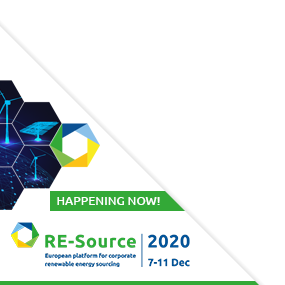Will Europe miss the renewable PPA revolution?
OPINION | Europe’s failure to embrace the potential of corporate renewable PPAs could be a huge mistake, says Aurélie Beauvais.
Corporate renewable energy (CRE) has been at the top of the global agenda in recent years, particularly in the US, where large corporations such as Google and Amazon have increasingly been signing long-term power-purchase agreements (PPAs) for wind and solar energy to power their activities.
Against all logic, Europe keeps shunning this promising trend.
Although the volume of corporate renewable PPAs contracted in Europe reached almost 1GW in 2016, Europe is still a tiny player compared to the US, where PPAs accounted for almost half of the 4GW of renewable energy installed in 2016, adding to its already impressive 5.3GW of CRE.
Europe’s disinterest in PPAs is not only worrying from an environmental point of view, it is also a huge mistake from a business perspective.
PPAs allow corporates to purchase renewable energy directly from a project developer/operator, meaning that they can simultaneously reduce their carbon footprint and manage volatile energy costs.
The next wave of corporate renewable energy champions
Through corporate sourcing, companies benefit from a fixed price per kW over long periods, up to 25 years in some cases. This stability is a huge competitive advantage in the context of highly volatile energy markets: price swings in fossil fuel can translate into millions of euros in additional energy costs for large companies.
Coupled with the relatively low prices of renewable energy, investing in CRE for companies becomes a no-brainer.
“Since we’ve started doing our long term PPAs, we’ve seen many other traditional companies follow suit, so I believe we’re starting to see industry in general realise that this is just not the right thing to do, but it’s good business as well,” says Joseph Kava, global vice-president at Google.
A new report by the WWF, Ceres and CDP found that nearly 80,000 emissions-reducing projects resulted in 190 companies saving a combined $3.bn in 2016 alone. This is especially true for PV, as costs for solar energy have dropped over 75% in the past six years, with a further 25-40% decrease expected by 2020.
This is a win-win strategy. While corporates reap the rewards, renewable energy producers also benefit from long-term, stable payments from private operators.
However, despite clear environmental and economic benefits, Europe still lacks a proper framework to take advantage of this new model. In many EU countries, PPAs belong to a grey area of legislation and tend to have cumbersome administrative processes that can mean a PPA takes years to sign.
The European Commission’s Clean Energy Package is a key opportunity to facilitate the growth of PPAs in Europe. Notably, the Renewable Energy Directive can facilitate the removal of market barriers and burdensome costs, creating a fair and competitive market in which corporate customers can purchase electricity from the provider of their choosing.
Not only will this foster innovation in the electricity market, it will also accelerate the fulfilment of Europe’s renewables targets – and without any public money!
So why is Europe shunning the PPAs revolution?
There is a noticeable absence of education and communication about PPAs in Europe, which is stalling the development of an effective regulatory framework.
Many people believe that PPAs are simply another corporate social responsibility ploy, or a model that is interchangeable with existing legislation such as feed-in-tariffs or guarantees of origin. These misconceptions have clouded the prospects for PPAs in Europe, which means that European companies and citizens are missing out on millions of euros in energy savings, as well as the opportunity to significantly reduce their carbon emissions and create a cleaner, more prosperous society.
"Many people believe PPAs are simply another corporate social responsibility ploy"
We need to create awareness about the benefits of PPAs for everyone involved through improved dialogue between all stakeholders – buyers, sellers, policymakers, and the public – if we want to see PPAs reach their full potential in Europe.
Acknowledging the challenge, SolarPower Europe and WindEurope have created a platform for stakeholders to connect and discuss the benefits and prospects for PPAs in Europe, at their RE-Source event in Brussels on 10-11 October.
This event – the first of its kind – will gather a wide range of multinational corporations, renewable energy developers and senior decision-makers to raise awareness, exchange information and facilitate connections in order to rapidly increase the procurement of CRE.
As we consider the progressive phase-out of public subsidies for renewables, corporate PPAs are an effective and relevant driver for the future uptake of clean energy. It is about time for Europe to seize this opportunity: the PPA revolution is on its way, with or without us.
To learn more about PPAs and RE-Source visit the event’s website.
Aurélie Beauvais is policy director of SolarPower Europe





